HR9405 Managing People at Work Essay: Sustainability and Reflection
VerifiedAdded on 2022/09/16
|15
|3355
|31
Essay
AI Summary
This essay, submitted as part of the HR9405 module at Newcastle Business School, addresses the contemporary management issue of sustainability. The essay explores the significance of sustainability in business operations, highlighting its impact on people, the planet, and profit. It delves into the challenges managers face in integrating sustainability, including goal setting, environmental impact minimization, and responding to global concerns. The essay examines various theoretical concepts such as Corporate Social Responsibility, Stakeholder Theory, and Green Economics, providing real-life examples like Triodos Bank and Leon chains. The paper concludes with recommendations for businesses to adopt sustainable practices. The essay is divided into two parts: the first part is a detailed essay on sustainability; the second part provides a personal reflection on the learning journey during the seminar tasks.

Running head: MANAGEMENT 1
Managing people at work
Student Name
Institution
Managing people at work
Student Name
Institution
Paraphrase This Document
Need a fresh take? Get an instant paraphrase of this document with our AI Paraphraser
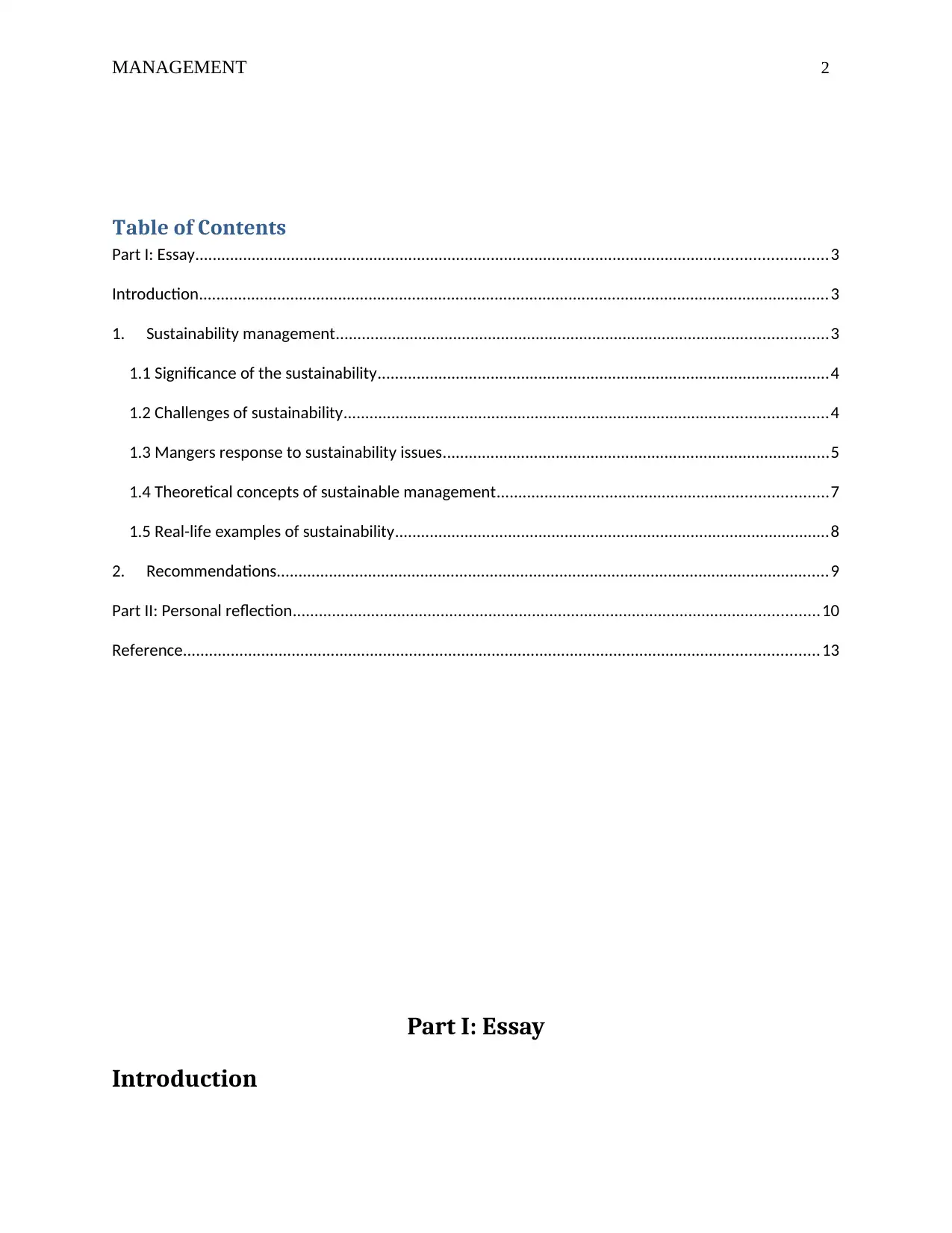
MANAGEMENT 2
Table of Contents
Part I: Essay.................................................................................................................................................3
Introduction.................................................................................................................................................3
1. Sustainability management.................................................................................................................3
1.1 Significance of the sustainability........................................................................................................4
1.2 Challenges of sustainability...............................................................................................................4
1.3 Mangers response to sustainability issues.........................................................................................5
1.4 Theoretical concepts of sustainable management............................................................................7
1.5 Real-life examples of sustainability....................................................................................................8
2. Recommendations...............................................................................................................................9
Part II: Personal reflection.........................................................................................................................10
Reference..................................................................................................................................................13
Part I: Essay
Introduction
Table of Contents
Part I: Essay.................................................................................................................................................3
Introduction.................................................................................................................................................3
1. Sustainability management.................................................................................................................3
1.1 Significance of the sustainability........................................................................................................4
1.2 Challenges of sustainability...............................................................................................................4
1.3 Mangers response to sustainability issues.........................................................................................5
1.4 Theoretical concepts of sustainable management............................................................................7
1.5 Real-life examples of sustainability....................................................................................................8
2. Recommendations...............................................................................................................................9
Part II: Personal reflection.........................................................................................................................10
Reference..................................................................................................................................................13
Part I: Essay
Introduction
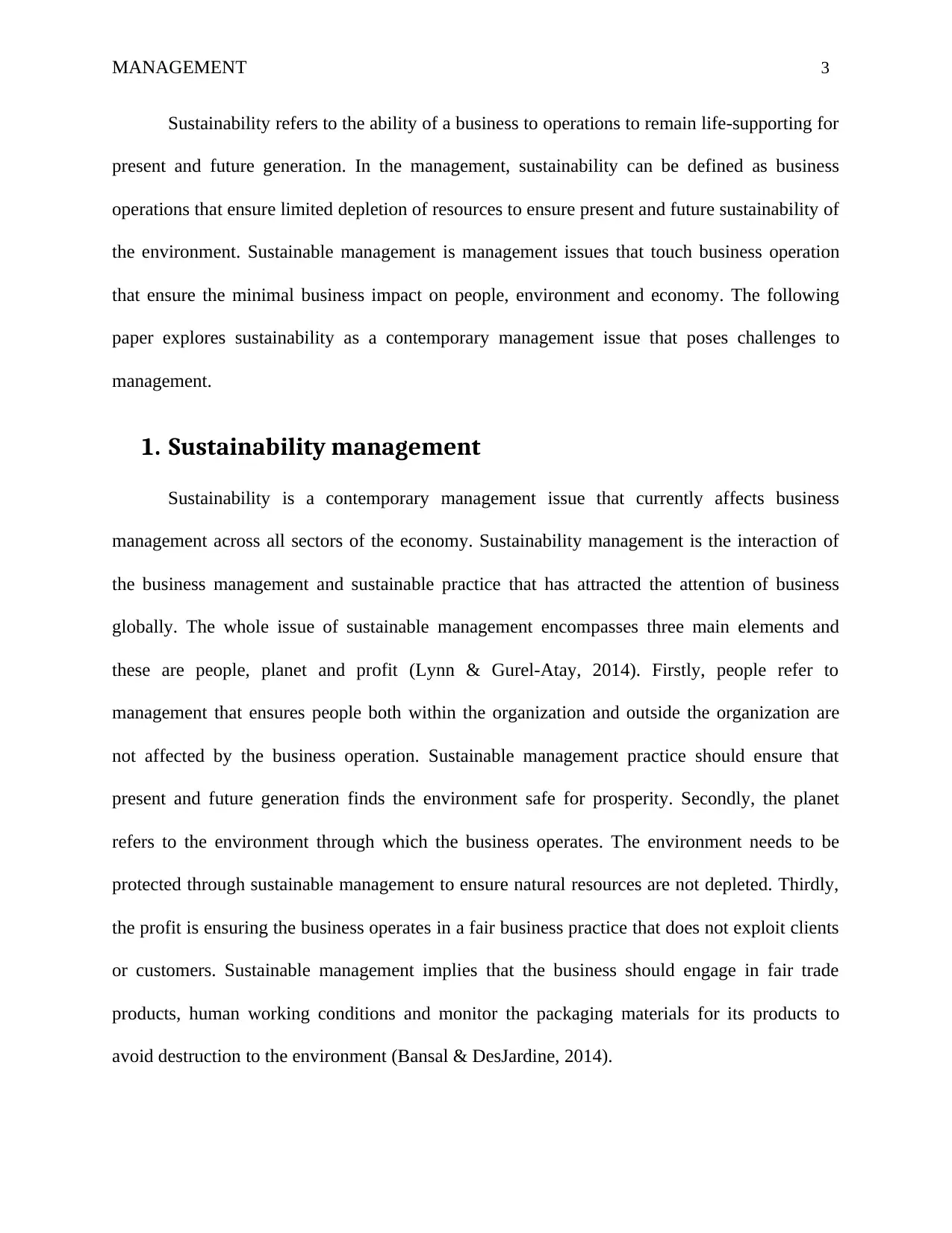
MANAGEMENT 3
Sustainability refers to the ability of a business to operations to remain life-supporting for
present and future generation. In the management, sustainability can be defined as business
operations that ensure limited depletion of resources to ensure present and future sustainability of
the environment. Sustainable management is management issues that touch business operation
that ensure the minimal business impact on people, environment and economy. The following
paper explores sustainability as a contemporary management issue that poses challenges to
management.
1. Sustainability management
Sustainability is a contemporary management issue that currently affects business
management across all sectors of the economy. Sustainability management is the interaction of
the business management and sustainable practice that has attracted the attention of business
globally. The whole issue of sustainable management encompasses three main elements and
these are people, planet and profit (Lynn & Gurel-Atay, 2014). Firstly, people refer to
management that ensures people both within the organization and outside the organization are
not affected by the business operation. Sustainable management practice should ensure that
present and future generation finds the environment safe for prosperity. Secondly, the planet
refers to the environment through which the business operates. The environment needs to be
protected through sustainable management to ensure natural resources are not depleted. Thirdly,
the profit is ensuring the business operates in a fair business practice that does not exploit clients
or customers. Sustainable management implies that the business should engage in fair trade
products, human working conditions and monitor the packaging materials for its products to
avoid destruction to the environment (Bansal & DesJardine, 2014).
Sustainability refers to the ability of a business to operations to remain life-supporting for
present and future generation. In the management, sustainability can be defined as business
operations that ensure limited depletion of resources to ensure present and future sustainability of
the environment. Sustainable management is management issues that touch business operation
that ensure the minimal business impact on people, environment and economy. The following
paper explores sustainability as a contemporary management issue that poses challenges to
management.
1. Sustainability management
Sustainability is a contemporary management issue that currently affects business
management across all sectors of the economy. Sustainability management is the interaction of
the business management and sustainable practice that has attracted the attention of business
globally. The whole issue of sustainable management encompasses three main elements and
these are people, planet and profit (Lynn & Gurel-Atay, 2014). Firstly, people refer to
management that ensures people both within the organization and outside the organization are
not affected by the business operation. Sustainable management practice should ensure that
present and future generation finds the environment safe for prosperity. Secondly, the planet
refers to the environment through which the business operates. The environment needs to be
protected through sustainable management to ensure natural resources are not depleted. Thirdly,
the profit is ensuring the business operates in a fair business practice that does not exploit clients
or customers. Sustainable management implies that the business should engage in fair trade
products, human working conditions and monitor the packaging materials for its products to
avoid destruction to the environment (Bansal & DesJardine, 2014).
⊘ This is a preview!⊘
Do you want full access?
Subscribe today to unlock all pages.

Trusted by 1+ million students worldwide
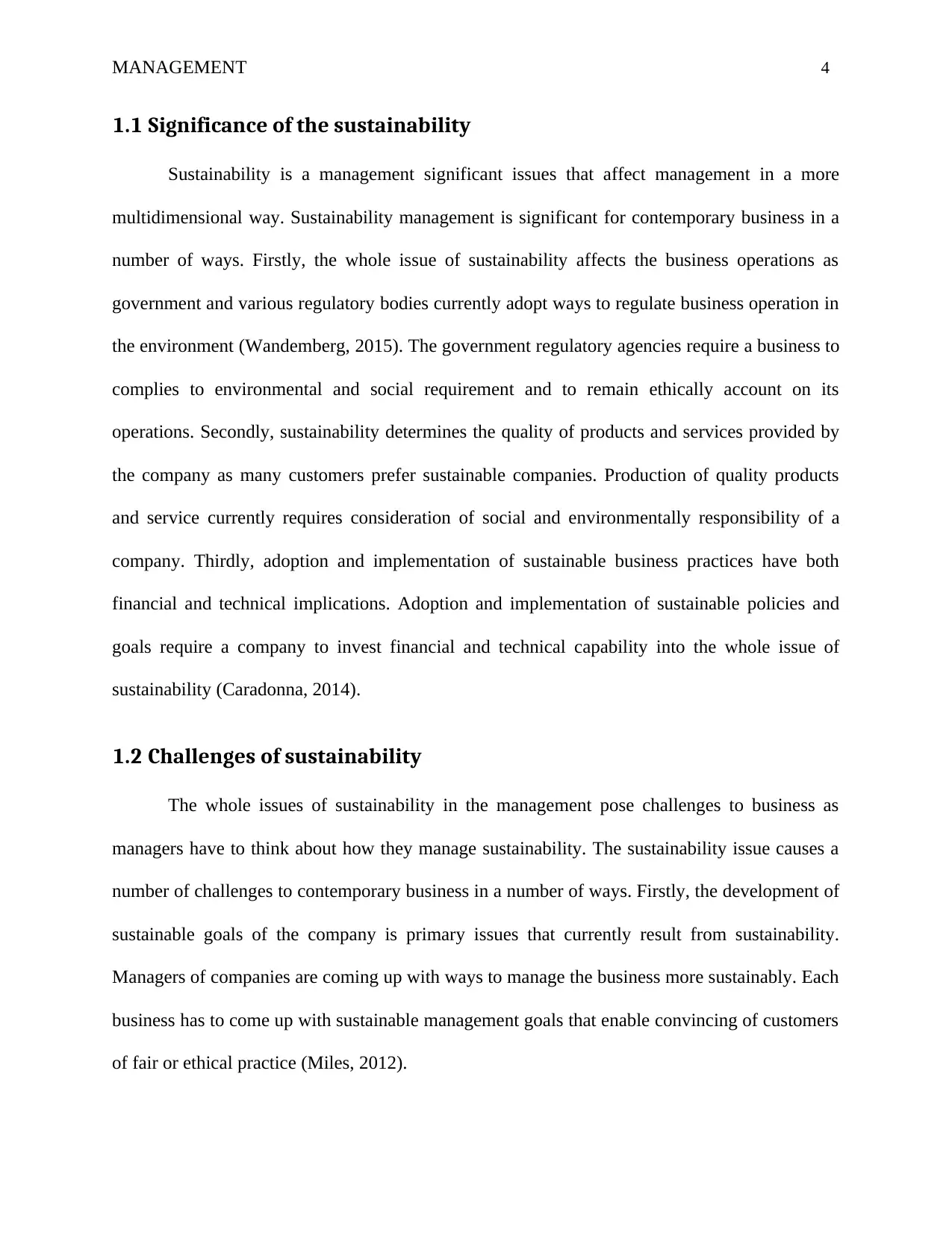
MANAGEMENT 4
1.1 Significance of the sustainability
Sustainability is a management significant issues that affect management in a more
multidimensional way. Sustainability management is significant for contemporary business in a
number of ways. Firstly, the whole issue of sustainability affects the business operations as
government and various regulatory bodies currently adopt ways to regulate business operation in
the environment (Wandemberg, 2015). The government regulatory agencies require a business to
complies to environmental and social requirement and to remain ethically account on its
operations. Secondly, sustainability determines the quality of products and services provided by
the company as many customers prefer sustainable companies. Production of quality products
and service currently requires consideration of social and environmentally responsibility of a
company. Thirdly, adoption and implementation of sustainable business practices have both
financial and technical implications. Adoption and implementation of sustainable policies and
goals require a company to invest financial and technical capability into the whole issue of
sustainability (Caradonna, 2014).
1.2 Challenges of sustainability
The whole issues of sustainability in the management pose challenges to business as
managers have to think about how they manage sustainability. The sustainability issue causes a
number of challenges to contemporary business in a number of ways. Firstly, the development of
sustainable goals of the company is primary issues that currently result from sustainability.
Managers of companies are coming up with ways to manage the business more sustainably. Each
business has to come up with sustainable management goals that enable convincing of customers
of fair or ethical practice (Miles, 2012).
1.1 Significance of the sustainability
Sustainability is a management significant issues that affect management in a more
multidimensional way. Sustainability management is significant for contemporary business in a
number of ways. Firstly, the whole issue of sustainability affects the business operations as
government and various regulatory bodies currently adopt ways to regulate business operation in
the environment (Wandemberg, 2015). The government regulatory agencies require a business to
complies to environmental and social requirement and to remain ethically account on its
operations. Secondly, sustainability determines the quality of products and services provided by
the company as many customers prefer sustainable companies. Production of quality products
and service currently requires consideration of social and environmentally responsibility of a
company. Thirdly, adoption and implementation of sustainable business practices have both
financial and technical implications. Adoption and implementation of sustainable policies and
goals require a company to invest financial and technical capability into the whole issue of
sustainability (Caradonna, 2014).
1.2 Challenges of sustainability
The whole issues of sustainability in the management pose challenges to business as
managers have to think about how they manage sustainability. The sustainability issue causes a
number of challenges to contemporary business in a number of ways. Firstly, the development of
sustainable goals of the company is primary issues that currently result from sustainability.
Managers of companies are coming up with ways to manage the business more sustainably. Each
business has to come up with sustainable management goals that enable convincing of customers
of fair or ethical practice (Miles, 2012).
Paraphrase This Document
Need a fresh take? Get an instant paraphrase of this document with our AI Paraphraser
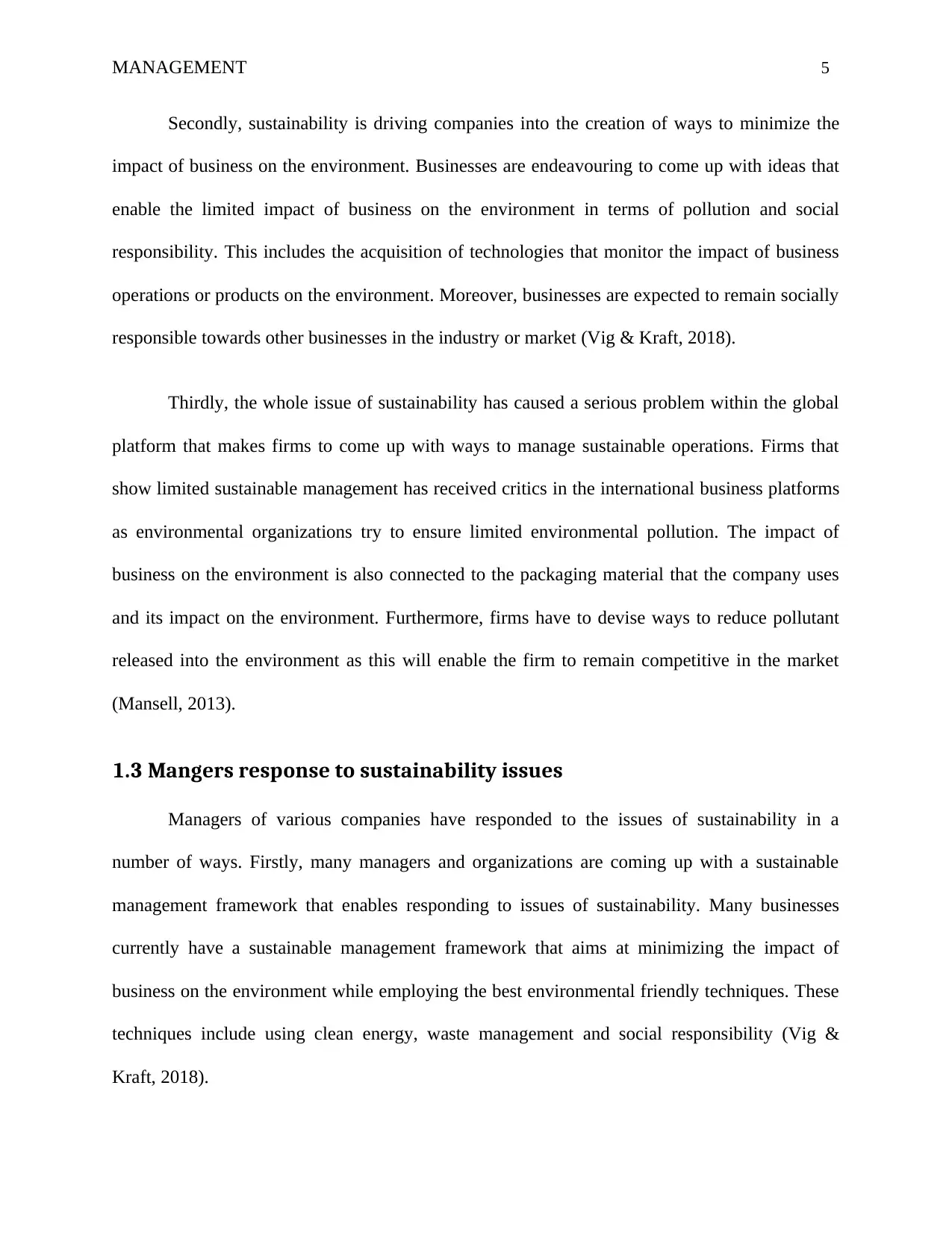
MANAGEMENT 5
Secondly, sustainability is driving companies into the creation of ways to minimize the
impact of business on the environment. Businesses are endeavouring to come up with ideas that
enable the limited impact of business on the environment in terms of pollution and social
responsibility. This includes the acquisition of technologies that monitor the impact of business
operations or products on the environment. Moreover, businesses are expected to remain socially
responsible towards other businesses in the industry or market (Vig & Kraft, 2018).
Thirdly, the whole issue of sustainability has caused a serious problem within the global
platform that makes firms to come up with ways to manage sustainable operations. Firms that
show limited sustainable management has received critics in the international business platforms
as environmental organizations try to ensure limited environmental pollution. The impact of
business on the environment is also connected to the packaging material that the company uses
and its impact on the environment. Furthermore, firms have to devise ways to reduce pollutant
released into the environment as this will enable the firm to remain competitive in the market
(Mansell, 2013).
1.3 Mangers response to sustainability issues
Managers of various companies have responded to the issues of sustainability in a
number of ways. Firstly, many managers and organizations are coming up with a sustainable
management framework that enables responding to issues of sustainability. Many businesses
currently have a sustainable management framework that aims at minimizing the impact of
business on the environment while employing the best environmental friendly techniques. These
techniques include using clean energy, waste management and social responsibility (Vig &
Kraft, 2018).
Secondly, sustainability is driving companies into the creation of ways to minimize the
impact of business on the environment. Businesses are endeavouring to come up with ideas that
enable the limited impact of business on the environment in terms of pollution and social
responsibility. This includes the acquisition of technologies that monitor the impact of business
operations or products on the environment. Moreover, businesses are expected to remain socially
responsible towards other businesses in the industry or market (Vig & Kraft, 2018).
Thirdly, the whole issue of sustainability has caused a serious problem within the global
platform that makes firms to come up with ways to manage sustainable operations. Firms that
show limited sustainable management has received critics in the international business platforms
as environmental organizations try to ensure limited environmental pollution. The impact of
business on the environment is also connected to the packaging material that the company uses
and its impact on the environment. Furthermore, firms have to devise ways to reduce pollutant
released into the environment as this will enable the firm to remain competitive in the market
(Mansell, 2013).
1.3 Mangers response to sustainability issues
Managers of various companies have responded to the issues of sustainability in a
number of ways. Firstly, many managers and organizations are coming up with a sustainable
management framework that enables responding to issues of sustainability. Many businesses
currently have a sustainable management framework that aims at minimizing the impact of
business on the environment while employing the best environmental friendly techniques. These
techniques include using clean energy, waste management and social responsibility (Vig &
Kraft, 2018).
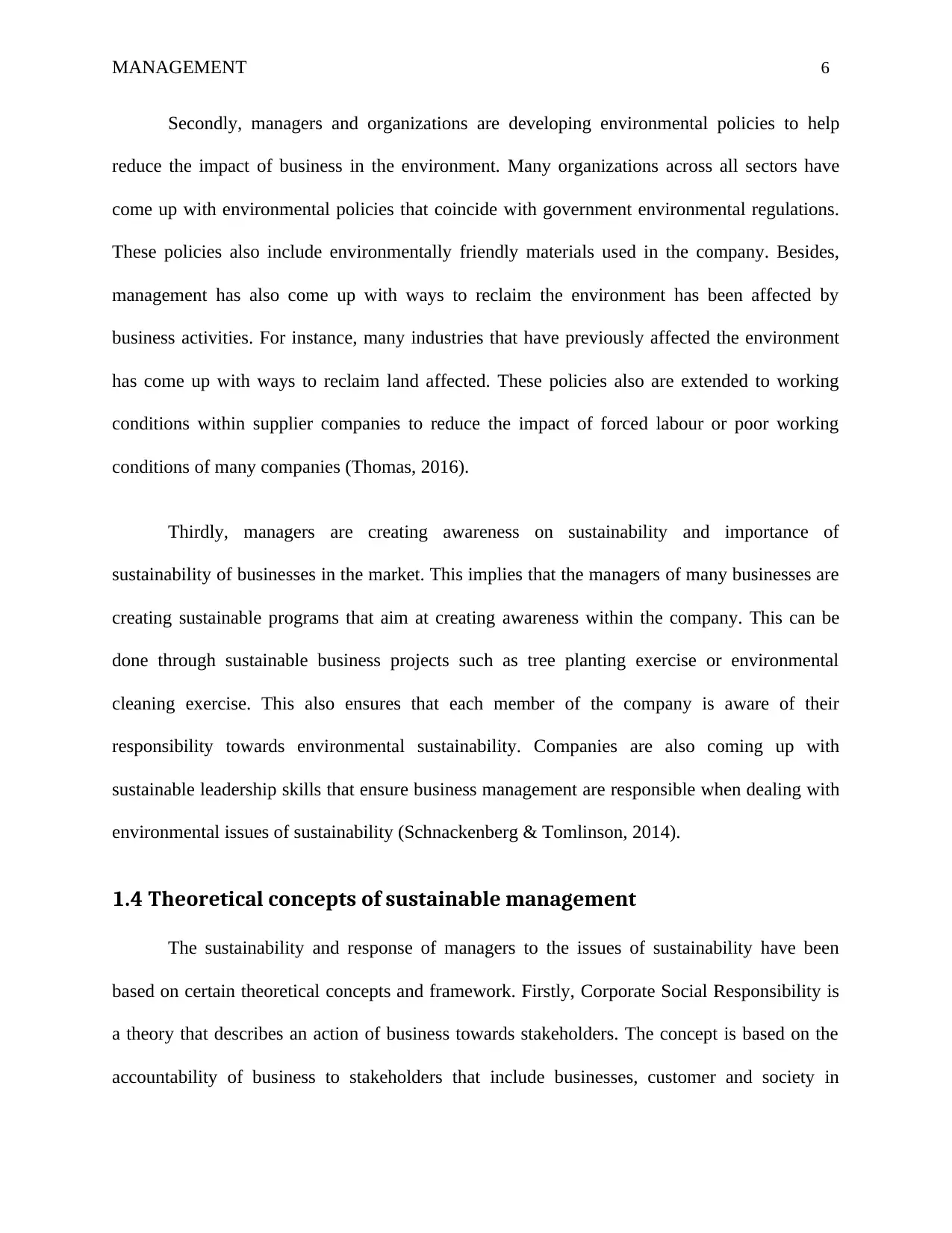
MANAGEMENT 6
Secondly, managers and organizations are developing environmental policies to help
reduce the impact of business in the environment. Many organizations across all sectors have
come up with environmental policies that coincide with government environmental regulations.
These policies also include environmentally friendly materials used in the company. Besides,
management has also come up with ways to reclaim the environment has been affected by
business activities. For instance, many industries that have previously affected the environment
has come up with ways to reclaim land affected. These policies also are extended to working
conditions within supplier companies to reduce the impact of forced labour or poor working
conditions of many companies (Thomas, 2016).
Thirdly, managers are creating awareness on sustainability and importance of
sustainability of businesses in the market. This implies that the managers of many businesses are
creating sustainable programs that aim at creating awareness within the company. This can be
done through sustainable business projects such as tree planting exercise or environmental
cleaning exercise. This also ensures that each member of the company is aware of their
responsibility towards environmental sustainability. Companies are also coming up with
sustainable leadership skills that ensure business management are responsible when dealing with
environmental issues of sustainability (Schnackenberg & Tomlinson, 2014).
1.4 Theoretical concepts of sustainable management
The sustainability and response of managers to the issues of sustainability have been
based on certain theoretical concepts and framework. Firstly, Corporate Social Responsibility is
a theory that describes an action of business towards stakeholders. The concept is based on the
accountability of business to stakeholders that include businesses, customer and society in
Secondly, managers and organizations are developing environmental policies to help
reduce the impact of business in the environment. Many organizations across all sectors have
come up with environmental policies that coincide with government environmental regulations.
These policies also include environmentally friendly materials used in the company. Besides,
management has also come up with ways to reclaim the environment has been affected by
business activities. For instance, many industries that have previously affected the environment
has come up with ways to reclaim land affected. These policies also are extended to working
conditions within supplier companies to reduce the impact of forced labour or poor working
conditions of many companies (Thomas, 2016).
Thirdly, managers are creating awareness on sustainability and importance of
sustainability of businesses in the market. This implies that the managers of many businesses are
creating sustainable programs that aim at creating awareness within the company. This can be
done through sustainable business projects such as tree planting exercise or environmental
cleaning exercise. This also ensures that each member of the company is aware of their
responsibility towards environmental sustainability. Companies are also coming up with
sustainable leadership skills that ensure business management are responsible when dealing with
environmental issues of sustainability (Schnackenberg & Tomlinson, 2014).
1.4 Theoretical concepts of sustainable management
The sustainability and response of managers to the issues of sustainability have been
based on certain theoretical concepts and framework. Firstly, Corporate Social Responsibility is
a theory that describes an action of business towards stakeholders. The concept is based on the
accountability of business to stakeholders that include businesses, customer and society in
⊘ This is a preview!⊘
Do you want full access?
Subscribe today to unlock all pages.

Trusted by 1+ million students worldwide
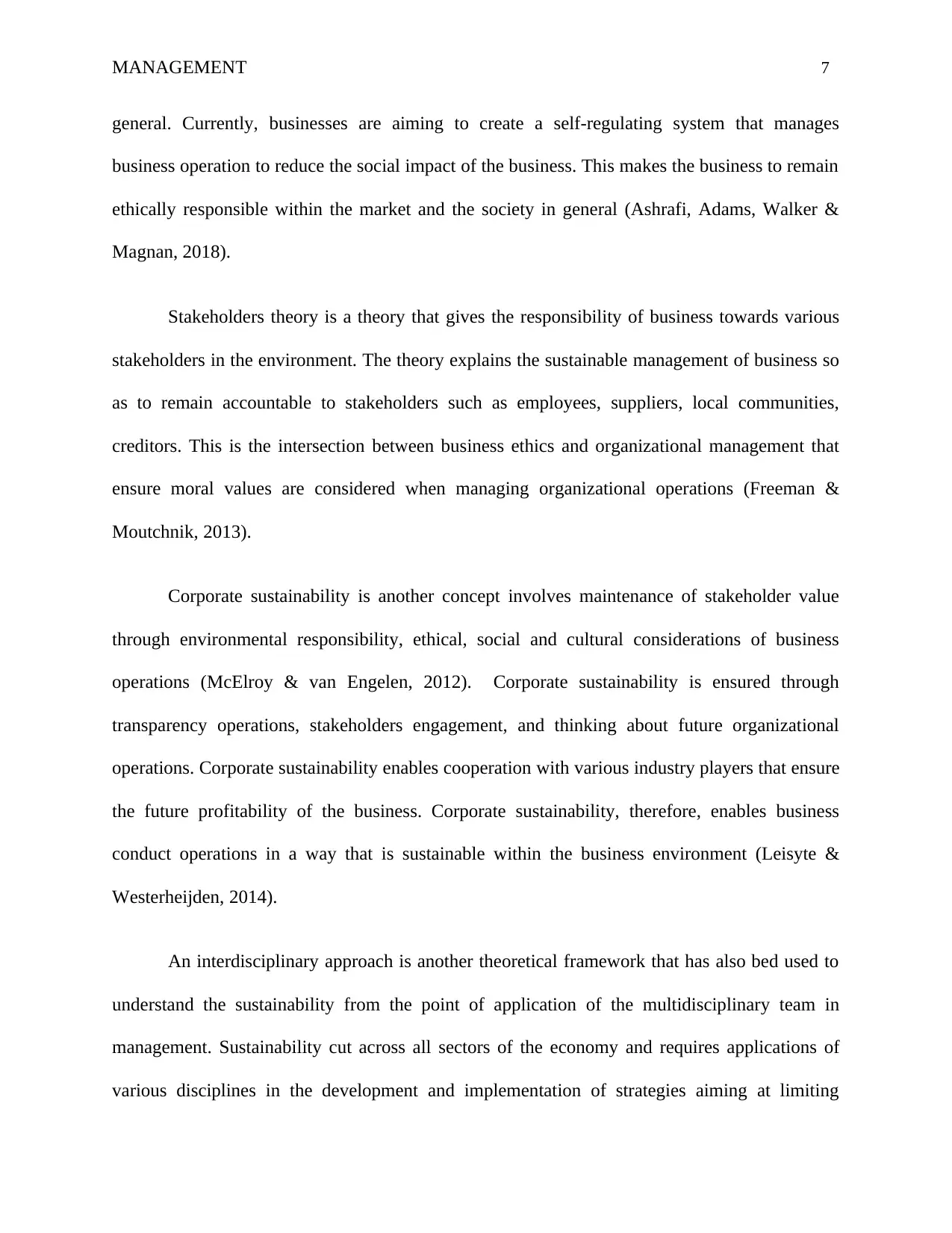
MANAGEMENT 7
general. Currently, businesses are aiming to create a self-regulating system that manages
business operation to reduce the social impact of the business. This makes the business to remain
ethically responsible within the market and the society in general (Ashrafi, Adams, Walker &
Magnan, 2018).
Stakeholders theory is a theory that gives the responsibility of business towards various
stakeholders in the environment. The theory explains the sustainable management of business so
as to remain accountable to stakeholders such as employees, suppliers, local communities,
creditors. This is the intersection between business ethics and organizational management that
ensure moral values are considered when managing organizational operations (Freeman &
Moutchnik, 2013).
Corporate sustainability is another concept involves maintenance of stakeholder value
through environmental responsibility, ethical, social and cultural considerations of business
operations (McElroy & van Engelen, 2012). Corporate sustainability is ensured through
transparency operations, stakeholders engagement, and thinking about future organizational
operations. Corporate sustainability enables cooperation with various industry players that ensure
the future profitability of the business. Corporate sustainability, therefore, enables business
conduct operations in a way that is sustainable within the business environment (Leisyte &
Westerheijden, 2014).
An interdisciplinary approach is another theoretical framework that has also bed used to
understand the sustainability from the point of application of the multidisciplinary team in
management. Sustainability cut across all sectors of the economy and requires applications of
various disciplines in the development and implementation of strategies aiming at limiting
general. Currently, businesses are aiming to create a self-regulating system that manages
business operation to reduce the social impact of the business. This makes the business to remain
ethically responsible within the market and the society in general (Ashrafi, Adams, Walker &
Magnan, 2018).
Stakeholders theory is a theory that gives the responsibility of business towards various
stakeholders in the environment. The theory explains the sustainable management of business so
as to remain accountable to stakeholders such as employees, suppliers, local communities,
creditors. This is the intersection between business ethics and organizational management that
ensure moral values are considered when managing organizational operations (Freeman &
Moutchnik, 2013).
Corporate sustainability is another concept involves maintenance of stakeholder value
through environmental responsibility, ethical, social and cultural considerations of business
operations (McElroy & van Engelen, 2012). Corporate sustainability is ensured through
transparency operations, stakeholders engagement, and thinking about future organizational
operations. Corporate sustainability enables cooperation with various industry players that ensure
the future profitability of the business. Corporate sustainability, therefore, enables business
conduct operations in a way that is sustainable within the business environment (Leisyte &
Westerheijden, 2014).
An interdisciplinary approach is another theoretical framework that has also bed used to
understand the sustainability from the point of application of the multidisciplinary team in
management. Sustainability cut across all sectors of the economy and requires applications of
various disciplines in the development and implementation of strategies aiming at limiting
Paraphrase This Document
Need a fresh take? Get an instant paraphrase of this document with our AI Paraphraser
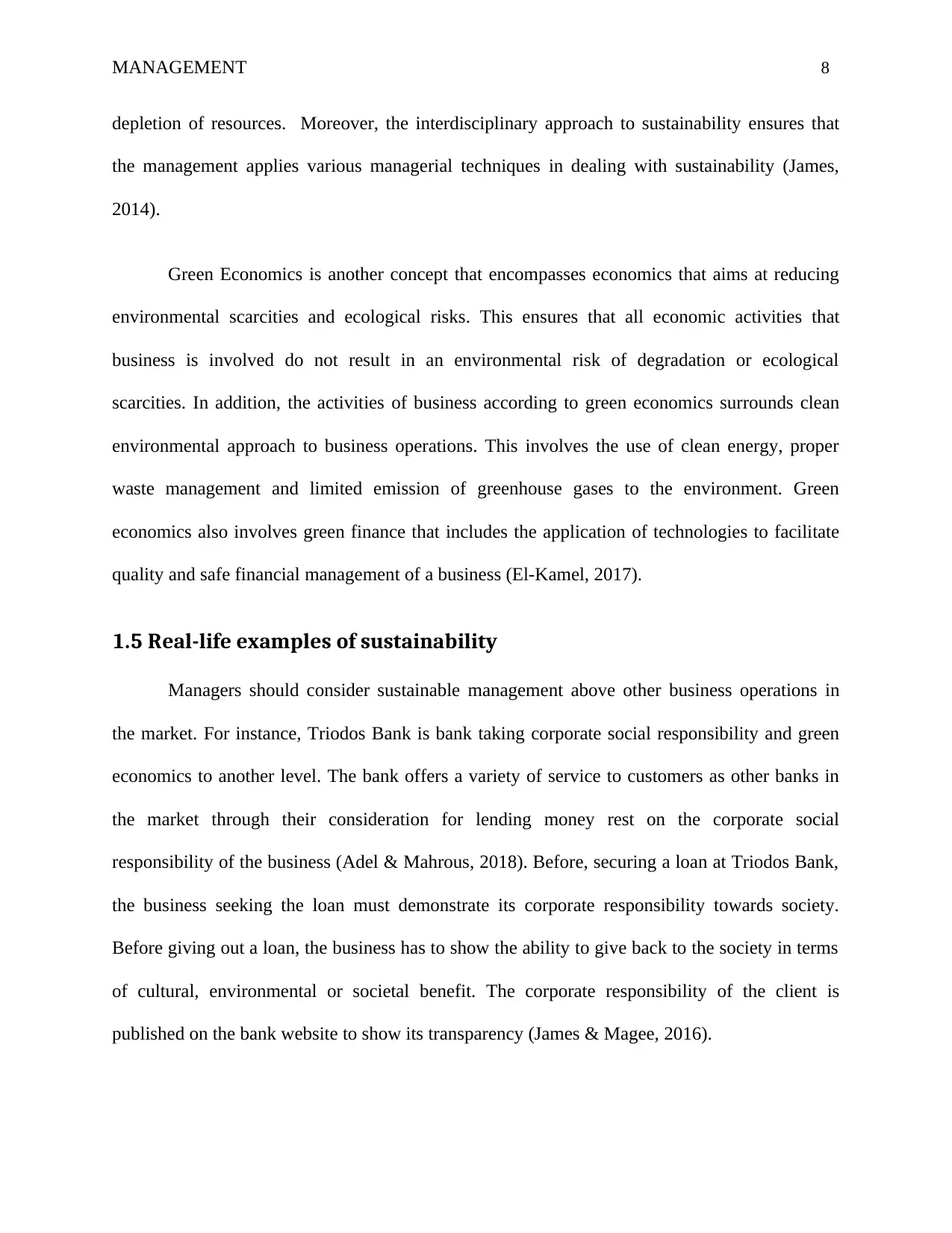
MANAGEMENT 8
depletion of resources. Moreover, the interdisciplinary approach to sustainability ensures that
the management applies various managerial techniques in dealing with sustainability (James,
2014).
Green Economics is another concept that encompasses economics that aims at reducing
environmental scarcities and ecological risks. This ensures that all economic activities that
business is involved do not result in an environmental risk of degradation or ecological
scarcities. In addition, the activities of business according to green economics surrounds clean
environmental approach to business operations. This involves the use of clean energy, proper
waste management and limited emission of greenhouse gases to the environment. Green
economics also involves green finance that includes the application of technologies to facilitate
quality and safe financial management of a business (El-Kamel, 2017).
1.5 Real-life examples of sustainability
Managers should consider sustainable management above other business operations in
the market. For instance, Triodos Bank is bank taking corporate social responsibility and green
economics to another level. The bank offers a variety of service to customers as other banks in
the market through their consideration for lending money rest on the corporate social
responsibility of the business (Adel & Mahrous, 2018). Before, securing a loan at Triodos Bank,
the business seeking the loan must demonstrate its corporate responsibility towards society.
Before giving out a loan, the business has to show the ability to give back to the society in terms
of cultural, environmental or societal benefit. The corporate responsibility of the client is
published on the bank website to show its transparency (James & Magee, 2016).
depletion of resources. Moreover, the interdisciplinary approach to sustainability ensures that
the management applies various managerial techniques in dealing with sustainability (James,
2014).
Green Economics is another concept that encompasses economics that aims at reducing
environmental scarcities and ecological risks. This ensures that all economic activities that
business is involved do not result in an environmental risk of degradation or ecological
scarcities. In addition, the activities of business according to green economics surrounds clean
environmental approach to business operations. This involves the use of clean energy, proper
waste management and limited emission of greenhouse gases to the environment. Green
economics also involves green finance that includes the application of technologies to facilitate
quality and safe financial management of a business (El-Kamel, 2017).
1.5 Real-life examples of sustainability
Managers should consider sustainable management above other business operations in
the market. For instance, Triodos Bank is bank taking corporate social responsibility and green
economics to another level. The bank offers a variety of service to customers as other banks in
the market through their consideration for lending money rest on the corporate social
responsibility of the business (Adel & Mahrous, 2018). Before, securing a loan at Triodos Bank,
the business seeking the loan must demonstrate its corporate responsibility towards society.
Before giving out a loan, the business has to show the ability to give back to the society in terms
of cultural, environmental or societal benefit. The corporate responsibility of the client is
published on the bank website to show its transparency (James & Magee, 2016).
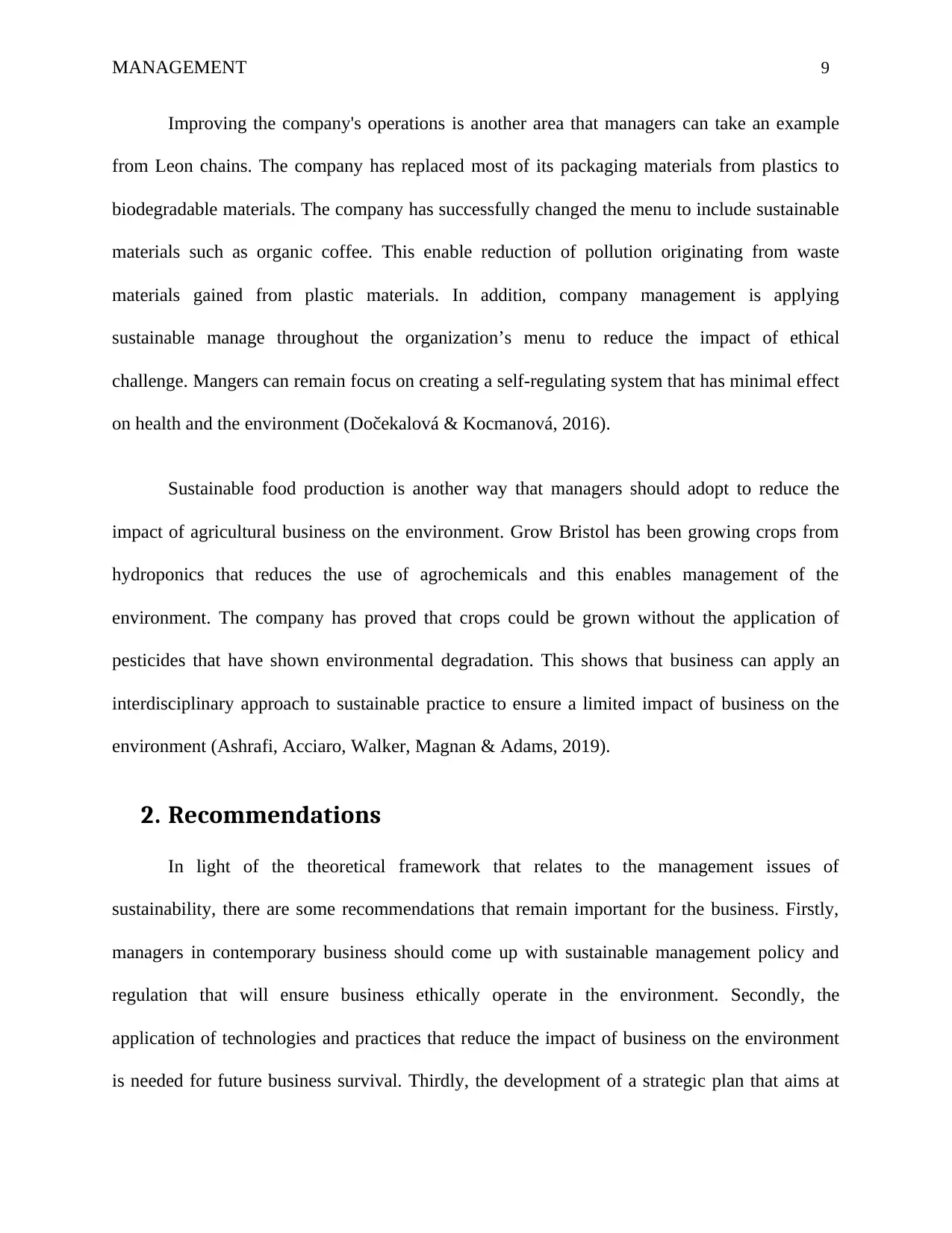
MANAGEMENT 9
Improving the company's operations is another area that managers can take an example
from Leon chains. The company has replaced most of its packaging materials from plastics to
biodegradable materials. The company has successfully changed the menu to include sustainable
materials such as organic coffee. This enable reduction of pollution originating from waste
materials gained from plastic materials. In addition, company management is applying
sustainable manage throughout the organization’s menu to reduce the impact of ethical
challenge. Mangers can remain focus on creating a self-regulating system that has minimal effect
on health and the environment (Dočekalová & Kocmanová, 2016).
Sustainable food production is another way that managers should adopt to reduce the
impact of agricultural business on the environment. Grow Bristol has been growing crops from
hydroponics that reduces the use of agrochemicals and this enables management of the
environment. The company has proved that crops could be grown without the application of
pesticides that have shown environmental degradation. This shows that business can apply an
interdisciplinary approach to sustainable practice to ensure a limited impact of business on the
environment (Ashrafi, Acciaro, Walker, Magnan & Adams, 2019).
2. Recommendations
In light of the theoretical framework that relates to the management issues of
sustainability, there are some recommendations that remain important for the business. Firstly,
managers in contemporary business should come up with sustainable management policy and
regulation that will ensure business ethically operate in the environment. Secondly, the
application of technologies and practices that reduce the impact of business on the environment
is needed for future business survival. Thirdly, the development of a strategic plan that aims at
Improving the company's operations is another area that managers can take an example
from Leon chains. The company has replaced most of its packaging materials from plastics to
biodegradable materials. The company has successfully changed the menu to include sustainable
materials such as organic coffee. This enable reduction of pollution originating from waste
materials gained from plastic materials. In addition, company management is applying
sustainable manage throughout the organization’s menu to reduce the impact of ethical
challenge. Mangers can remain focus on creating a self-regulating system that has minimal effect
on health and the environment (Dočekalová & Kocmanová, 2016).
Sustainable food production is another way that managers should adopt to reduce the
impact of agricultural business on the environment. Grow Bristol has been growing crops from
hydroponics that reduces the use of agrochemicals and this enables management of the
environment. The company has proved that crops could be grown without the application of
pesticides that have shown environmental degradation. This shows that business can apply an
interdisciplinary approach to sustainable practice to ensure a limited impact of business on the
environment (Ashrafi, Acciaro, Walker, Magnan & Adams, 2019).
2. Recommendations
In light of the theoretical framework that relates to the management issues of
sustainability, there are some recommendations that remain important for the business. Firstly,
managers in contemporary business should come up with sustainable management policy and
regulation that will ensure business ethically operate in the environment. Secondly, the
application of technologies and practices that reduce the impact of business on the environment
is needed for future business survival. Thirdly, the development of a strategic plan that aims at
⊘ This is a preview!⊘
Do you want full access?
Subscribe today to unlock all pages.

Trusted by 1+ million students worldwide
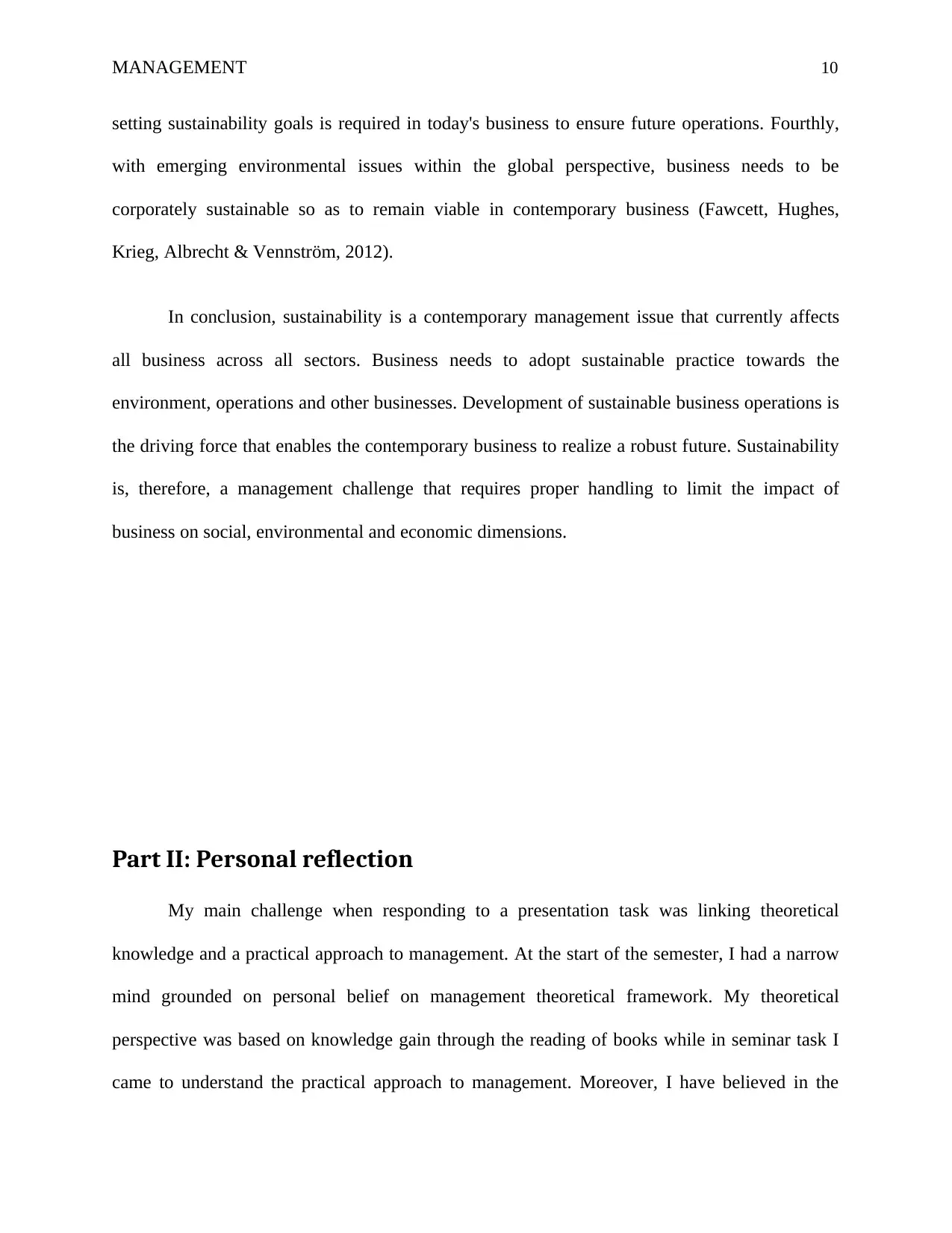
MANAGEMENT 10
setting sustainability goals is required in today's business to ensure future operations. Fourthly,
with emerging environmental issues within the global perspective, business needs to be
corporately sustainable so as to remain viable in contemporary business (Fawcett, Hughes,
Krieg, Albrecht & Vennström, 2012).
In conclusion, sustainability is a contemporary management issue that currently affects
all business across all sectors. Business needs to adopt sustainable practice towards the
environment, operations and other businesses. Development of sustainable business operations is
the driving force that enables the contemporary business to realize a robust future. Sustainability
is, therefore, a management challenge that requires proper handling to limit the impact of
business on social, environmental and economic dimensions.
Part II: Personal reflection
My main challenge when responding to a presentation task was linking theoretical
knowledge and a practical approach to management. At the start of the semester, I had a narrow
mind grounded on personal belief on management theoretical framework. My theoretical
perspective was based on knowledge gain through the reading of books while in seminar task I
came to understand the practical approach to management. Moreover, I have believed in the
setting sustainability goals is required in today's business to ensure future operations. Fourthly,
with emerging environmental issues within the global perspective, business needs to be
corporately sustainable so as to remain viable in contemporary business (Fawcett, Hughes,
Krieg, Albrecht & Vennström, 2012).
In conclusion, sustainability is a contemporary management issue that currently affects
all business across all sectors. Business needs to adopt sustainable practice towards the
environment, operations and other businesses. Development of sustainable business operations is
the driving force that enables the contemporary business to realize a robust future. Sustainability
is, therefore, a management challenge that requires proper handling to limit the impact of
business on social, environmental and economic dimensions.
Part II: Personal reflection
My main challenge when responding to a presentation task was linking theoretical
knowledge and a practical approach to management. At the start of the semester, I had a narrow
mind grounded on personal belief on management theoretical framework. My theoretical
perspective was based on knowledge gain through the reading of books while in seminar task I
came to understand the practical approach to management. Moreover, I have believed in the
Paraphrase This Document
Need a fresh take? Get an instant paraphrase of this document with our AI Paraphraser
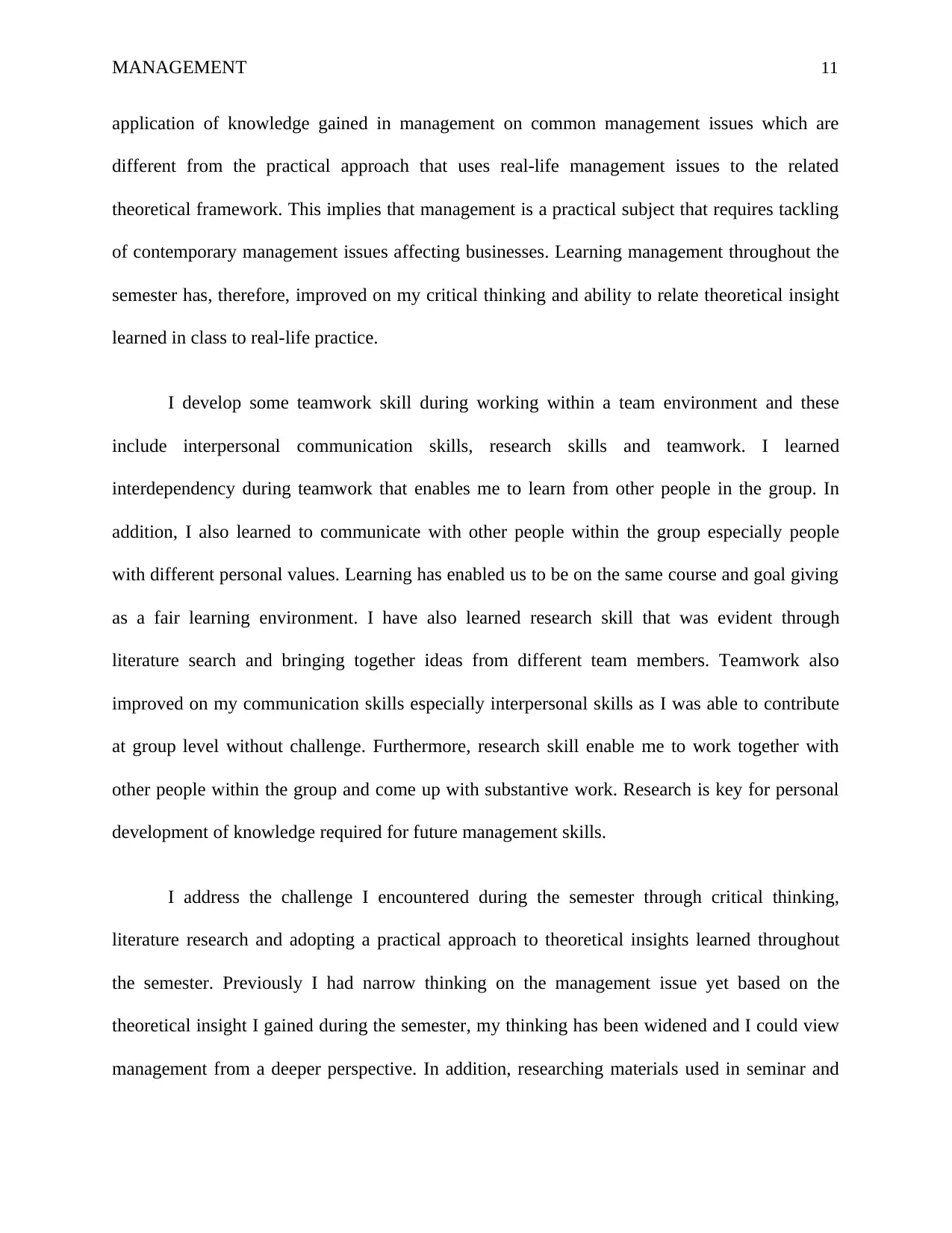
MANAGEMENT 11
application of knowledge gained in management on common management issues which are
different from the practical approach that uses real-life management issues to the related
theoretical framework. This implies that management is a practical subject that requires tackling
of contemporary management issues affecting businesses. Learning management throughout the
semester has, therefore, improved on my critical thinking and ability to relate theoretical insight
learned in class to real-life practice.
I develop some teamwork skill during working within a team environment and these
include interpersonal communication skills, research skills and teamwork. I learned
interdependency during teamwork that enables me to learn from other people in the group. In
addition, I also learned to communicate with other people within the group especially people
with different personal values. Learning has enabled us to be on the same course and goal giving
as a fair learning environment. I have also learned research skill that was evident through
literature search and bringing together ideas from different team members. Teamwork also
improved on my communication skills especially interpersonal skills as I was able to contribute
at group level without challenge. Furthermore, research skill enable me to work together with
other people within the group and come up with substantive work. Research is key for personal
development of knowledge required for future management skills.
I address the challenge I encountered during the semester through critical thinking,
literature research and adopting a practical approach to theoretical insights learned throughout
the semester. Previously I had narrow thinking on the management issue yet based on the
theoretical insight I gained during the semester, my thinking has been widened and I could view
management from a deeper perspective. In addition, researching materials used in seminar and
application of knowledge gained in management on common management issues which are
different from the practical approach that uses real-life management issues to the related
theoretical framework. This implies that management is a practical subject that requires tackling
of contemporary management issues affecting businesses. Learning management throughout the
semester has, therefore, improved on my critical thinking and ability to relate theoretical insight
learned in class to real-life practice.
I develop some teamwork skill during working within a team environment and these
include interpersonal communication skills, research skills and teamwork. I learned
interdependency during teamwork that enables me to learn from other people in the group. In
addition, I also learned to communicate with other people within the group especially people
with different personal values. Learning has enabled us to be on the same course and goal giving
as a fair learning environment. I have also learned research skill that was evident through
literature search and bringing together ideas from different team members. Teamwork also
improved on my communication skills especially interpersonal skills as I was able to contribute
at group level without challenge. Furthermore, research skill enable me to work together with
other people within the group and come up with substantive work. Research is key for personal
development of knowledge required for future management skills.
I address the challenge I encountered during the semester through critical thinking,
literature research and adopting a practical approach to theoretical insights learned throughout
the semester. Previously I had narrow thinking on the management issue yet based on the
theoretical insight I gained during the semester, my thinking has been widened and I could view
management from a deeper perspective. In addition, researching materials used in seminar and
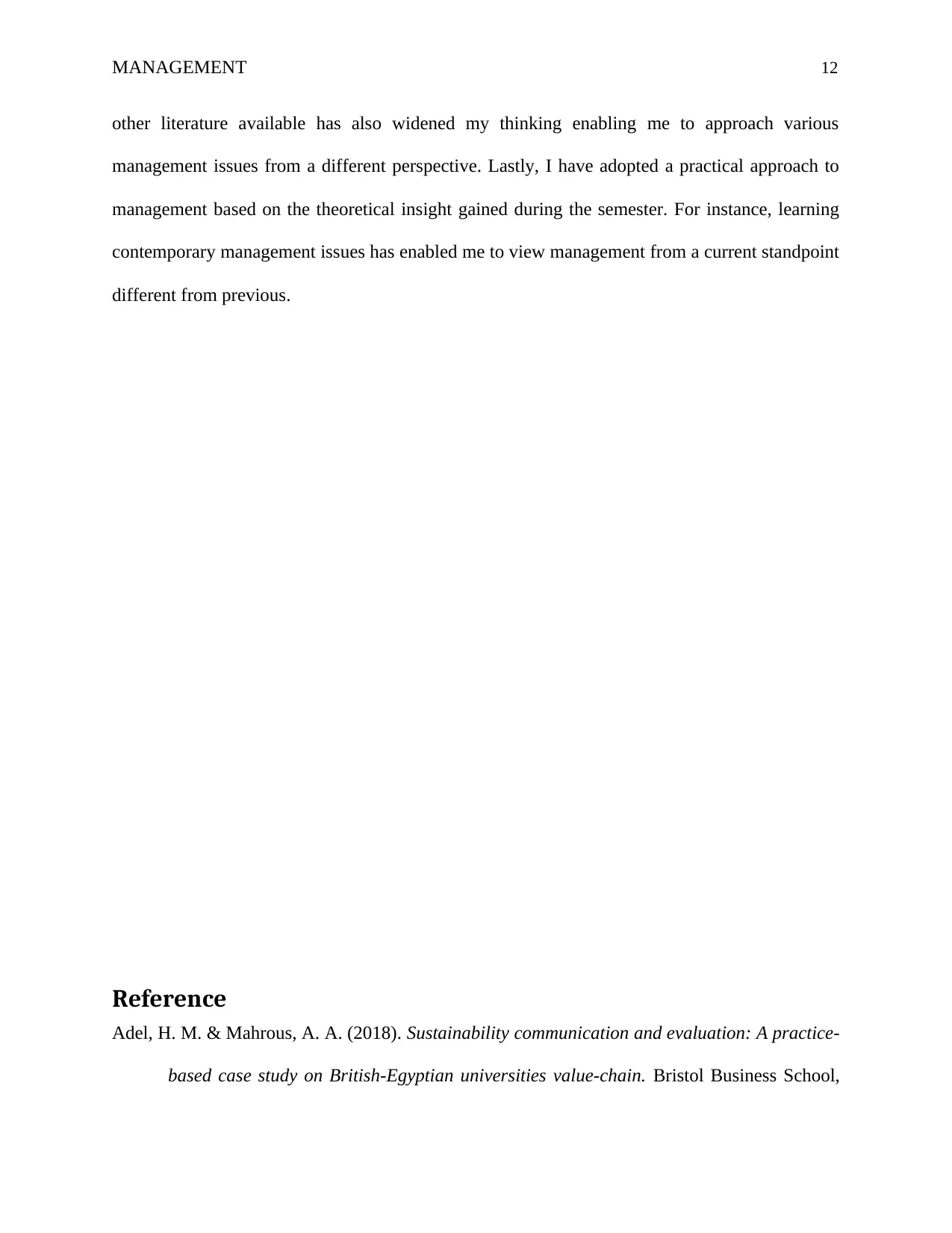
MANAGEMENT 12
other literature available has also widened my thinking enabling me to approach various
management issues from a different perspective. Lastly, I have adopted a practical approach to
management based on the theoretical insight gained during the semester. For instance, learning
contemporary management issues has enabled me to view management from a current standpoint
different from previous.
Reference
Adel, H. M. & Mahrous, A. A. (2018). Sustainability communication and evaluation: A practice-
based case study on British-Egyptian universities value-chain. Bristol Business School,
other literature available has also widened my thinking enabling me to approach various
management issues from a different perspective. Lastly, I have adopted a practical approach to
management based on the theoretical insight gained during the semester. For instance, learning
contemporary management issues has enabled me to view management from a current standpoint
different from previous.
Reference
Adel, H. M. & Mahrous, A. A. (2018). Sustainability communication and evaluation: A practice-
based case study on British-Egyptian universities value-chain. Bristol Business School,
⊘ This is a preview!⊘
Do you want full access?
Subscribe today to unlock all pages.

Trusted by 1+ million students worldwide
1 out of 15
Related Documents
Your All-in-One AI-Powered Toolkit for Academic Success.
+13062052269
info@desklib.com
Available 24*7 on WhatsApp / Email
![[object Object]](/_next/static/media/star-bottom.7253800d.svg)
Unlock your academic potential
Copyright © 2020–2025 A2Z Services. All Rights Reserved. Developed and managed by ZUCOL.





